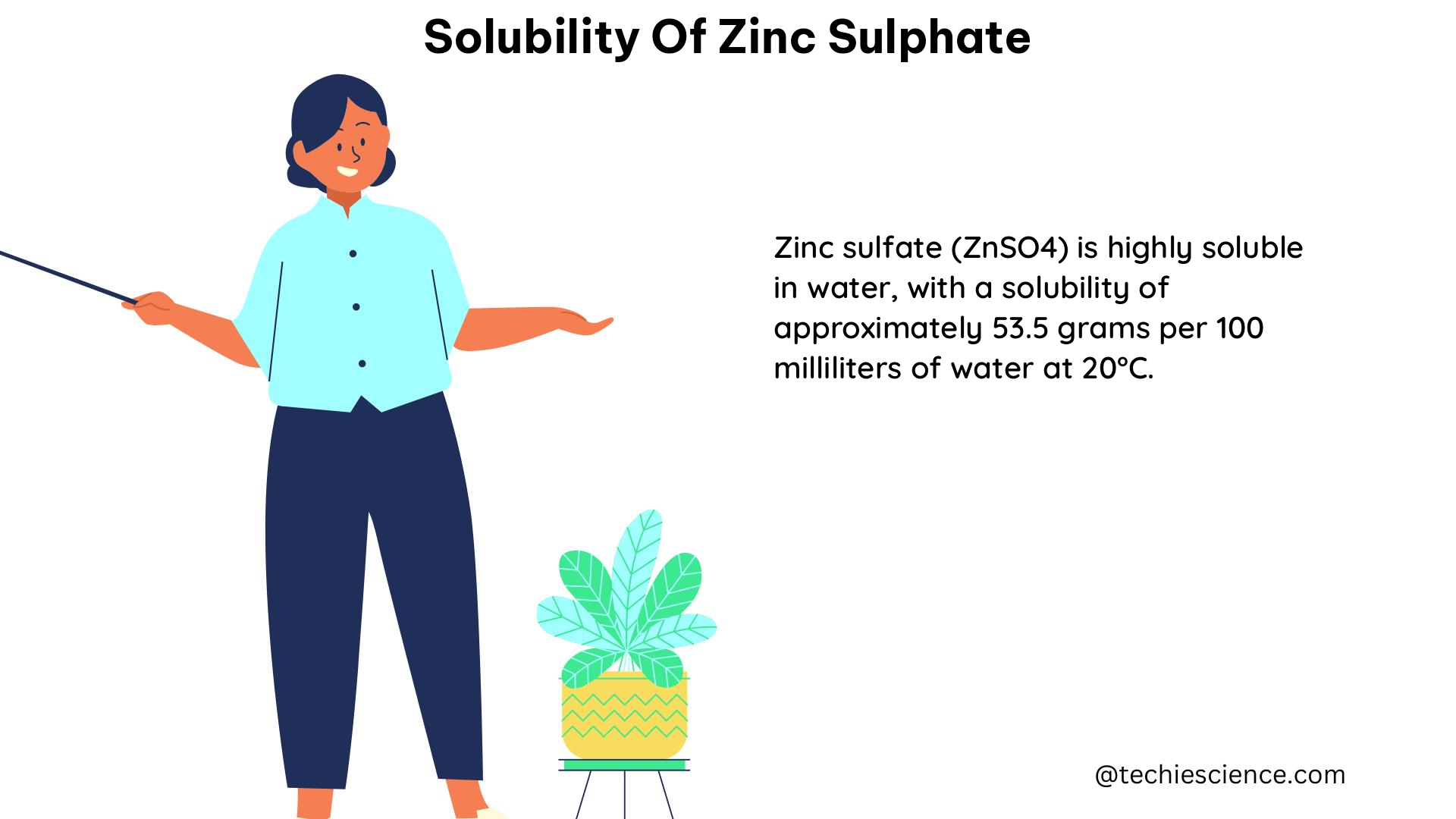The solubility of zinc sulphate (ZnSO4) in water is approximately 57.7 g/100 mL at 20°C. This value is for the heptahydrate form of zinc sulphate (ZnSO4·7H2O), also known as Goslarite. The monohydrate form (ZnSO4·H2O), known as Gunningite, is insoluble in ethanol. The anhydrous form of zinc sulphate is not found naturally and is not a stable dehydration intermediate. The solubility of zinc sulphate in alcohol is also mentioned, but the specific value is not provided.
Understanding the Hydration States of Zinc Sulphate
Zinc sulphate can exist in various hydration states, each with its own unique properties and solubility characteristics. The three main forms are:
- Heptahydrate (ZnSO4·7H2O): This is the most common and stable form of zinc sulphate, with a solubility of approximately 57.7 g/100 mL in water at 20°C.
- Monohydrate (ZnSO4·H2O): Also known as Gunningite, this form is insoluble in ethanol.
- Anhydrous (ZnSO4): The anhydrous form is not found naturally and is not a stable dehydration intermediate.
The transition between these hydration states is influenced by factors such as temperature, humidity, and the presence of other ions in the solution.
Calculating the Hydration State from Experimental Data

In the given experiment, a student heated 4.38 g of hydrated zinc sulphate and obtained 2.46 g of anhydrous zinc sulphate. Using these data, the value of the integer x in the formula ZnSO4·xH2O can be calculated as follows:
- Initial mass of hydrated zinc sulphate: 4.38 g
- Mass of anhydrous zinc sulphate: 2.46 g
- Mass of water lost during dehydration: 4.38 g – 2.46 g = 1.92 g
- Molar mass of water (H2O): 18.02 g/mol
- Molar mass of anhydrous zinc sulphate (ZnSO4): 161.47 g/mol
- Moles of water lost: 1.92 g / 18.02 g/mol = 0.1066 mol
- Moles of anhydrous zinc sulphate: 2.46 g / 161.47 g/mol = 0.0152 mol
- Moles of water per mole of anhydrous zinc sulphate: 0.1066 mol / 0.0152 mol = 7
Therefore, the hydrated zinc sulphate used in the experiment was the heptahydrate form (ZnSO4·7H2O).
Factors Affecting the Solubility of Zinc Sulphate
The solubility of zinc sulphate in water and other solvents is influenced by various factors, including:
-
Temperature: The solubility of zinc sulphate increases with increasing temperature. The solubility-temperature curve for pure ZnSO4 salts shows a significant increase in solubility as the temperature rises.
-
pH: The solubility of zinc sulphate is affected by the pH of the solution. In acidic environments, the solubility of zinc sulphate increases due to the formation of the Zn2+ ion. In alkaline environments, the solubility decreases due to the precipitation of zinc hydroxide (Zn(OH)2).
-
Presence of other ions: The solubility of zinc sulphate can be influenced by the presence of other ions in the solution. For example, the addition of sulfate ions can decrease the solubility of zinc sulphate due to the common ion effect.
-
Organic matter and microbial activity: In soil environments, the bioavailability of zinc, including zinc sulphate, is influenced by the presence of organic matter and microbial activity. These factors can affect the distribution of zinc among various forms in the soil.
Zinc Sulphate in Livestock Treatment and Mine Drainage
Zinc sulphate has various applications, including:
-
Livestock treatment: In the context of livestock treatment for papillomatous digital dermatitis (PDD), zinc sulphate is used in footbaths. The bioavailability of zinc in soils is influenced by factors such as total zinc content, organic matter, microbial activity, moisture, and interactions with other macro and micronutrients.
-
Mine drainage scenarios: In mine drainage scenarios, hydrous zinc sulfates are commonly found. The cycle of dehydration, hydration, dissolution, and recrystallization of these compounds varies seasonally with temperature and rainfall. The structure of the hydrocolloid metal sulfates has been elucidated at the atomic level, revealing a complex system of interaction not only between the soil and zinc ions but also between additional ions of magnesium, nickel, iron, copper, cobalt, and manganese.
These applications highlight the importance of understanding the solubility and behavior of zinc sulphate in various environmental and industrial contexts.
Conclusion
The solubility of zinc sulphate is a crucial property that has significant implications in various fields, from livestock treatment to mine drainage management. By understanding the factors that influence the solubility of zinc sulphate, researchers and practitioners can optimize its use and address related challenges more effectively.
References
- PubChem: Zinc Sulfate
- ChemHume: Solubility of Salts
- ResearchGate: Solubility vs. temperature curve for pure ZnSO4 salts
- Quizlet: Amount of Substance
- USDA: Zinc Sulfate report 2015

The lambdageeks.com Core SME Team is a group of experienced subject matter experts from diverse scientific and technical fields including Physics, Chemistry, Technology,Electronics & Electrical Engineering, Automotive, Mechanical Engineering. Our team collaborates to create high-quality, well-researched articles on a wide range of science and technology topics for the lambdageeks.com website.
All Our Senior SME are having more than 7 Years of experience in the respective fields . They are either Working Industry Professionals or assocaited With different Universities. Refer Our Authors Page to get to know About our Core SMEs.